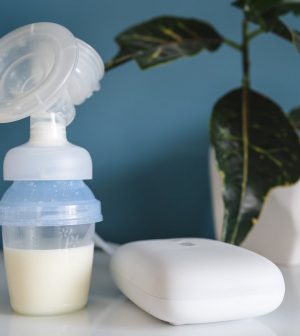- Could Your Grocery Store Meat Be Causing Recurring UTIs?
- Are You Making This Expensive Thermostat Error This Winter?
- Recognizing the Signs of Hypothyroidism
- 10 Strategies to Overcome Insomnia
- Could Artificial Sweeteners Be Aging the Brain Faster?
- Techniques for Soothing Your Nervous System
- Does the Water in Your House Smell Funny? Here’s Why
- Can a Daily Dose of Apple Cider Vinegar Actually Aid Weight Loss?
- 6 Health Beverages That Can Actually Spike Your Blood Sugar
- Treatment Options for Social Anxiety Disorder
Breast Pumps Greatly Extend the Time a Mom Breastfeeds

Women who use a breast pump to store milk for their infant tend to breastfeed 21 weeks longer, on average, compared to moms who don’t use the devices, new research finds.
Breast pumps have gained wide use among busy new moms: 91% of mothers responding to the Yale University researchers said they’d used one.
“This statistic demonstrates the near ubiquitous practice of pump use,” said study lead author Dr. Deanna Nardella, a research fellow in the department of pediatrics at Yale School of Medicine.
Breastfeeding is by far the most nutritionally complete feeding option for infants. The American Academy of Pediatrics currently advocates for exclusive breastfeeding of infants for the first six months of life, with “continued breastfeeding, along with appropriate complementary foods introduced at about six months, as long as mutually desired by mother and child for 2 years or beyond.”
But as many new mothers know, work and other issues can make consistent breastfeeding difficult. Breast pumps help a nursing mom store her milk so it can be given to baby by herself, dad or another caregiver.
In the new study, researchers tallied breast pump use and breastfeeding duration for over 19,000 U.S. mothers. Data was compiled between 2016 and 2021 by the U.S. Centers for Disease Control and Prevention.
Nardella’s team found that the vast majority of the women had availed themselves of a breast pump. The devices extended their ability to breastfeed by an average of almost five months.
Women who used pumps were also much less likely to quit breastfeeding early.
The new data is important, given that in 2012 the Affordable Care Act mandated that insurers cover the cost of breast pumps.
“Ensuring access to pumps for U.S. families could help mitigate known inequities in breastfeeding duration rates,” Nardella said in a Yale news release. The study found breast pump use showed the greatest benefit in extending breastfeeding among Black women and Native American women.
The findings were published recently in the Journal of Pediatrics.
More information
Find out more about using a breast pump at the March of Dimes.
SOURCE: Yale University, news release, Aug. 1, 2024
Source: HealthDay
Copyright © 2026 HealthDay. All rights reserved.










